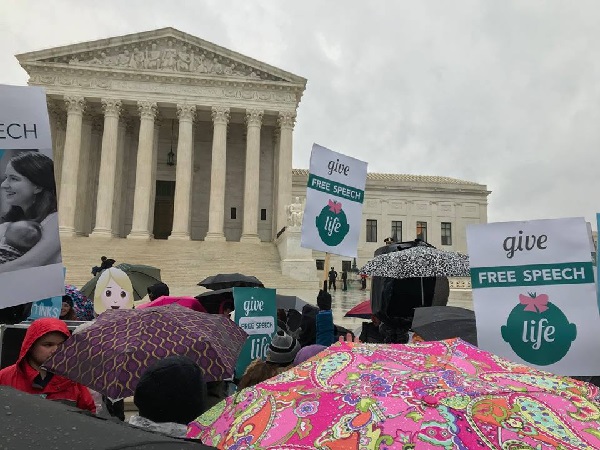Forced Speech for Pregnancy Centers is Not Free Speech
“Compelled speech is not the answer to cultural conflict” is the message Texas Values and numerous other faith, family, and legal organizations are giving to the U.S. Supreme Court this morning.
Today, the High Court is hearing oral arguments in National Institute of Family and Life Advocates v. Becerra. Alliance Defending Freedom (ADF) General Counsel Michael Farris is set to argue on behalf of NIFLA in the case. Several pro-life, free speech, and religious freedom organizations including Texas Values joined an amicus (friend of the court) brief in the case. (See the attached PDF file to read the amicus brief.)
Farris and ADF attorneys filed their reply brief with the Supreme Court on behalf of NIFLA, a pro-life pregnancy center network, on March 14, to answer the state of California’s argument that it can force pro-life centers to advertise for the abortion industry. California had passed Assembly Bill 775, the so-called “Reproductive FACT Act,” in 2015, which requires licensed medical centers that offer free, pro-life help to pregnant women to post a disclosure saying that California provides free or low-cost abortion and contraception services.
Defending the rights of pregnancy care centers is familiar turf for the Texas Values team, according to Nicole Hudgens, Policy Analyst.
“This Supreme Court case is about the government using its power to force pro-life pregnancy centers to provide free advertising for abortion. We believe the U.S. Supreme Court will side with pro-life pregnancy centers, just like the federal court did in Texas when the City of Austin tried to restrict the free speech for pro-life pregnancy centers. The city lost a lawsuit and had to pay $480,000 in attorney fees with tax dollars.” said Nicole Hudgens, Texas Values Policy Analyst. “We stand with NIFLA and the right to free speech- without government restriction.”
Jonathan Saenz, attorney and President of Texas Values, was one of the lawyers that successfully defended Austin pregnancy centers in a similar case.
Other courts have invalidated or mostly invalidated similar laws in Austin, Baltimore, New York City, and Montgomery County, Maryland.
“Compelled speech is not the answer to cultural conflict. This court must not render professionals second-class citizens with diminished constitutional rights,” wrote David French, the lead counsel for the amicus brief.
According to Farris the California law goes far beyond a simple disclaimer and becomes advertising. The required disclosure must also include a phone number for a county office that refers women to Planned Parenthood and others in the abortion industry. The law also forces unlicensed pregnancy centers to add large disclosures in multiple languages about their non-medical status in advertisements, which obscure and crowd out their pro-life speech. Failure to comply carries civil fines up to $1,000 per violation.
“No one should be forced to provide free advertising for the abortion industry — least of all pro-life pregnancy centers,” said Farris. “Yet here, the government designed this statute to single out pro-life pregnancy centers and force them to use their walls as billboards to point the way to abortion. Information about abortion is widely available, and the government has many other ways it can do what it wants to without trampling on the First Amendment protected freedoms of pro-life advocates.”
Twenty-two states, 144 members of Congress, and many others have filed friend-of-the-court briefs urging the Supreme Court to reverse the U.S. Court of Appeals for the 9th Circuit and a lower court’s ruling that allows California to enforce AB 775.
Supporters of NIFLA are using the hashtag #GiveFreeSpeechLife to signal social media support for the pregnancy care clinics.


